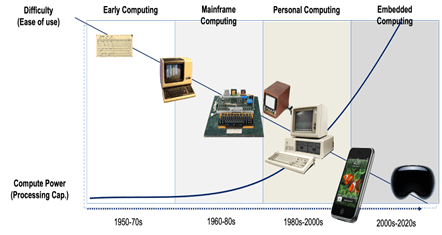A future driven by embedded technology and AI
Brett King, Author and podcast/radio show host
August 29, 2023
In an effort to crack the German Enigma machine, a cryptography device, a team of British cryptologists and engineers developed two prototype computing devices in 1943: the Bombe and the Colossus. The Colossus went through multiple iterations, and 10 of these early computing devices were deployed for codebreaking. The Colossus occupied the size of a living room, weighed 5 tonnes and used 8 kilowatts of power. It had 2,500 valves, about 100 logic gates and 10,000 resistors connected by 7 kilometers of wiring, and less than 3KB of working memory. In computing terms, this is as primitive as it gets.
The concept of personal computing devices was not entertained until the 1970s with the birth of the Apple I in 1976, followed by the IBM PC in 1981 and other similar devices. The Apple I had just 4KB of memory (expandable to 48KB), a 1 MHz CPU and a cassette tape drive for additional storage. It cost around $3,250 in today’s dollars.
In 1975, the world’s first supercomputer was born: the Cray-1 Supercomputer. It cost almost $40 million in today’s dollars to develop and remains one of the most successful supercomputers ever sold. It had a 64-bit processor, 8 MB of memory, 300 megabytes of storage and 160 megaflops of processing power, and it weighed 5.5 tons.
Today, your smartphone holds power that far surpasses early supercomputers. Even a single musical greeting card has more computing power than the entire world had at the end of World War II. This is the evolution of computing devices we have witnessed in less than 100 years.

Figure 2 - The Evolution of Computing Devices Over the Last 80 Years (Source: Brett King)
Computers everywhere
By 2050, there will be an estimated 100 billion devices connected to the internet. Your home will be a smart home with biometric door locks, smart appliances and even a household AI to manage your environment. If you own a car, it will be an autonomous vehicle. Most people will be subscribed to a service for access to a vehicle when needed, whether that is a personal flying drone to take you to the airport or an electric vehicle to drive you around town. Cities themselves will be smart with water, sanitation, transportation and other services being highly automated.
Not only that, the population of robots on the planet is expected to exceed that of humans by 2035. This includes not only factory and industrial robots, delivery bots/drones and household robot vacuum cleaners, but also self-driving cars, planetary exploration probes and even surgery robots that will be better than human surgeons.
The cost of basic computing devices will continue to plummet, despite the ever-approaching end to Moore’s Law. Computing devices are now exponentially more powerful than their early predecessors, and AI will soon create an even faster acceleration in computing power. When we reach the top of the exponential curve in computing power evolution, scientists call this the emergence of the singularity: the time when computing power is such that it can solve any problem mankind may throw at it.
If you wanted to use a computer in the 1960s, you needed a high degree of training. Computing power was extremely limited, so it was slow and tedious work. But today, a 2-year-old can pick up a tablet or smartphone and become a competent user within minutes. In 20 years, computers will be so smart and embedded in our world that they will operate seamlessly in conjunction with humans to the point where we won’t even necessarily know where that computer sits.
With cloud-based computing and AI, we will talk to our computers through sensors embedded in our world. No screen, keyboard or mouse will be necessary to operate most of the computers we will interact with. AI will start to anticipate our needs and proactively manage our environment, our schedule and even our health and finances.
What is the purpose of these advancements?
The smart world
Economists would say that the purpose of computing is economic productivity. Through the application of computing devices, we make our economies more efficient, producing greater resource utilization, profits and margin. Modern tech-based firms employ fewer people to produce significantly higher profits than corporations did just 20 to 30 years ago.
Scientists would say that advances in computing improves our ability to research and solve problems, and the evidence overwhelmingly supports this. The first human genome project was only possible with advances in computing, and today, researchers are working on gene-therapies that will eliminate entire diseases from our genome. AI is being used to advance engineering, materials science, medicine, mathematics and physics.
We are entering an era of almost limitless computing power that, when applied to the world around us, should revolutionize the way we think about almost every area of human existence.
Smart glasses like Vision Pro will become a mainstream personal computing device by the end of the decade. When you wear a computer on your face, you gain instant access to AI-based insights and are dynamically plugged into a world of commerce accessible through the smallest gesture or spoken word. From the AI-personal assistant that manages your day to the autonomous transportation that takes you to and from your daily connections, computing will augment your day-to-day schedule.
In the workplace, we will work side by side with advanced AIs that automate everything from collecting trash on our city streets to managing traffic, dispatching robotic emergency services vehicles and growing food in automated vertical farms.
In the preindustrial world, the most common form of transportation were horses. In the 2040s and 2050s, car ownership will be like that of horses today, insomuch as most people won’t own vehicles simply because they won’t need to. Obviously, there will be some cultural influence where the personal ownership of vehicles might be rare in Europe or Asia, but still popular in the U.S. where public transportation investment trails the rest of the world. But you won’t drive a car in the 2040s. It will drive you.
Computing is on an inexorable march toward a destination of almost endless advancement in computing power. We will think of computing access in the future the same way we think of access to water, electricity and other basic services. The real question remains whether this access to embedded, ubiquitous compute power will make the lives of humans better or whether it will be used to manipulate and control us. This is the choice we must make. There is no inevitability to the outcome of the march of computing, just opportunities.
- Topics:
- AI and machine learning
- Automation

